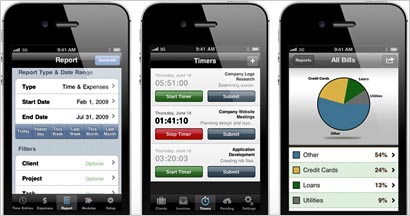
Signaling the increased seriousness with which it is entering the enterprise market, Apple launched late last week a section of its site that outlines how the iPhone is a business tool. Titling its pitch as “Not just another day at the
office,” Apple walks users through key business scenarios for using its device, from organizing schedules to managing projects and arranging travel. Each area of work life highlights three apps
-- some by Apple itself, but most from third parties like Kayak, BillMinder, Cisco and Tripit. Videos also accompany each task. A much less detailed site outlining the iPad’s business uses is
also at Apple.com.
Since its release in 2007, the iPhone has always been challenged by some enterprises and IT managers as more of a consumer than a business device. Concerns about security
and the ability to integrate the phone and iOS with internal business systems persisted even as Apple attempted to add and enhance these features with every version of iOS. In this site supporting the
iPhone in the enterprise, Apple underscores its ability to integrate with Microsoft Exchange, VPNs and office networks. Cases from companies like Dow are included.
advertisement
advertisement
Despite clear gains in the
enterprise markets, the most recent impartial survey of enterprise readiness still gives the nod to the struggling BlackBerry. Trend Micro, a leading provider of cloud security services, did a
comprehensive study of built-in security, application security, authentication functions, device wipe capabilities, firewalls, and virtualization among the major mobile platforms. BlackBerry 7.0
scored highest across the board, the company reports. Apple iOS was second, followed by Windows Phone 7.5 and Android 2.3. Research in Motion’s BlackBerry OS still excels at security and ease of
enterprise integration, the research found.
The study, which was carried out by The Altimeter Group and Bloor Research along with Trend Micro, praised both Apple and Microsoft for providing
good security and integration. Android appeared to be singled out for its fragmentation, which makes it difficult to issue operating system updates consistently and reliably across a fleet of diverse
phones.
Arguably, Microsoft issued the first self-titled smartphone years before the iPhone -- which was aimed mainly at the enterprise, since it was assumed that few consumers would
afford or want a computer in their pocket. RIM enjoyed business market dominance mainly on the strength of its messaging, as the company failed repeatedly to make Web and app functionality appealing
on its devices. Apple helped reinvent the category with the iPhone aimed at a consumer audience, which then became the market thrust of the second smartphone wave.
But this consumer focus has
delayed the proliferation of smartphones as enterprise tools -- and so perhaps the emergence of a massive market in b2b apps, marketing and services for these devices. Company IT managers have been
slow to migrate employees to this generation of touchscreen and devices, but are being pressed by their employees to integrate the phones the staff prefers to use. As Nigel Stanley, practice leader at
Bloor Research, says in this report, "security people I work with are scared witless by consumerization and the rapid adoption of these devices.”